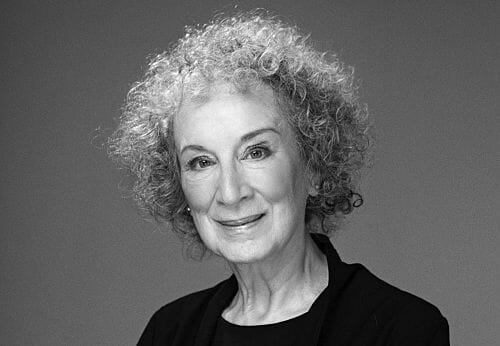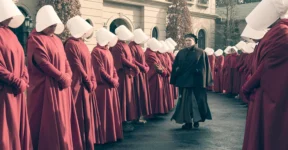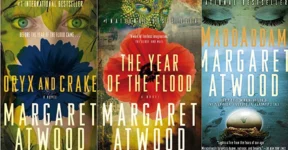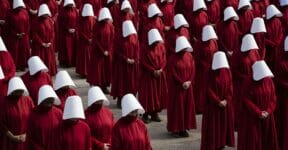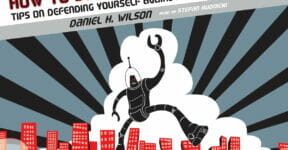In an interview with the Guardian in 2016, following the release of Hag-Seed, author Margaret Atwood – prominently known for dystopian works including The Handmaid’s Tale and Oryx and Crake – said, “All dystopian novels are telling you to do is make sure you’ve got a lot of canned goods and a gun. Do you have canned goods and a gun in Toronto? I’m too freaking old. I’m probably not going to make it through the zombie apocalypse anyway.” It was part joke, part criticism, and part reality, just like in many of her most remembered lines. Check out these quotes by Margaret Atwood now!
“War is what happens when language fails.” – The message couldn’t be any clearer here. All sorts of dispute and conflict of any scale never have to incite violence. Disagreement is not an incentive to escalate the matter into an armed battle, but a call for better communication.
“An eye for an eye only leads to more blindness.” – Still in the same tone, Atwood warns that violence only gives way to more violence. Eventually it will spread to a larger scale feud, putting everyone at risk of harm, if not death.
“A word after a word after a word is power.” – Once again, the Canadian novelist reiterates her message about the importance of communication, or more specifically the practice of choosing your words carefully, because what you say can have serious effects on people. The right words can save and inspire others, but the wrong ones will hurt.
“In the spring, at the end of the day, you should smell like dirt.” – Before your world turns into a dystopia, make the best of what you have all the time. When the day offers nice weather, spend time outdoors and appreciate the beauty all around. Take a slow long walk, run around on the beach, or do some gardening.
“Gardening is not a rational act.” – On the subject of gardening, the author admits it requires a lot of work. However, the activity does offer some excellent benefits like improved physical strength and reduced stress level, and sometimes food.
“I once had a garden. I can remember the smell of the turned earth, the plump shapes of bulbs held in the hands, fullness, the dry rustle of seeds through the fingers.” (Commander’s Wife from The Handmaid’s Tale)
“Our generation in the west was lucky: we had readymade gateways. We had books, paper, teachers, schools, and libraries. But many in the world lack these luxuries. How do you practice without such tryout venues?” – Atwood likely refers to how the world has both utopia and dystopia in different places. People living in the developed countries have so many books, schools, and libraries; in other places, kids must work hard just to buy pencils and paper. In certain societies, only the boys are allowed to go to school at all.
“I hope that people will finally come to realize that there is only one ‘race’ – the human race – and that we are all members of it.” – The notion that there is a superior race in the world, while the rest are inferior, makes no sense. It is a recurrent theme in dystopian fiction where a group of people feel they have the ultimate power over the others.
“Heroes need monsters to establish their heroic credentials. You need something scary to overcome.” – It is an explanation probably to younger readers on the brink of facing a brave new world of adulthood. The villains and monsters in science fiction are for the heroes to find strength and grow up. Heroes need monsters just like everyone needs challenges in life.
“When things are really dismal, you can laugh, or you can cave in completely.” – There are many things in life that you cannot control, and therefore you are at their mercy. However, you always have control over how you react to anything that happens. You can either succumb to difficulties or focus on overcoming the problems.
Perspective plays a major role in life, and words can have different effects on people. The following quotes from Margaret Atwood seem to have broader meaning than what appears on the surface. Not only are they memorable, but also thought-provoking. The interpretations are best left to the individual reader.
“We still think of a powerful man as a born leader and a powerful woman as an anomaly.”
“If social stability goes pear-shaped, you have a choice between anarchy and dictatorship. Most people will opt for more security, even if they have to give up some personal freedom.”
“Our problem right now is that we’re so specialized that if the lights go out, there are a huge number of people who are not going to know what to do. But within every dystopia, there’s a little utopia.”
“Every utopia – let’s just stick with the literary ones – faces the same problem: What do you do with the people who don’t fit in?”
“The society in The Handmaid’s Tale is a throwback to the early Puritans whom I studied extensively at Harvard under Perry Miller, to whom the book is dedicated.”
“Please don’t make the mistake of thinking that ‘Oryx and Crake’ is anti-science. Science is a way of knowing, and a tool. Like all ways of knowing and tools, it can be turned to bad uses. And it can be bought and sold, and it often is. But it is not in itself bad. Like electricity, it’s neutral.”
“Every aspect of human technology has a dark side, including the bow and arrow.”
“Religions in general have to rediscover their roots. In Hinduism and the Koran, animals are described as equals. If you walk into a cathedral and look at the decorations of early Christianity, there are vines, animals, creatures, and birds thriving all over the stonework.”
“I hate to tell you this, but you will never actually go to a galaxy far, far away and encounter Darth Vader. That’s science fiction; it isn’t going to happen.”
“If the national mental illness of the United States is megalomania, that of Canada is paranoid schizophrenia.”
Margaret Atwood is a prolific writer and quoter of quotes! We love her stories because they seem like they could actually happen, and what happens can really stir your emotions. Got any quotes by Margaret Atwood not listed here that you really like? Let us know. We’d love to hear from you.
Other things you might want to know about.
What made Margaret Atwood famous?
Margaret Atwood is most famous for the novel ‘The Handmaid’s Tale which was published in 1985. Many think the inspiration for this book is from the real life events of the Salem Witch Trials where women were accused of witchcraft.
What do we know about Margaret Atwood?
According to notable biographies.com Atwood is one of Canada’s best-known writers. She is an internationally famous novelist, poet, and critic. She also is committed to positive change in our way of life.
At the age of six she was writing plays, poems, comic books, and had started a novel. While in high school she concentrated on writing poetry. Her favorite writer as a teen was Edgar Allen Poe who was famous for his dark, mystery stories. She earned a bachelor’s degree in 1961 at Victoria College, University of Toronto and received her masters at Radcliffe in Cambridge, Massachusetts. She also studied at Harvard University.
What are some other works by Margaret Atwood?
biographies.com states that Atwood wrote ‘The Circle Game’ which was her first major book of poems. She won the Governors General’s Award for this in 1966. She won this award again for her 1985 novel, ‘The Handmaid’s Tale.’
In 1981 she worked on a tv drama called ‘Snowbird’ and had her children’s book ‘Anna’s Pet’ adapted for the stage in 1986. She has short story collections called ‘Dancing Girls’ (1977), ‘Bluebeard’s Egg’ (1983) and ‘Murder in the Dark’ (1983).
Atwood is also a talented photographer and watercolorist. She has an official Margaret Atwood Website which she actively edits and updates often. Her favorite charity is Artists Against Racism. The address is: http:www.owtoad.com

